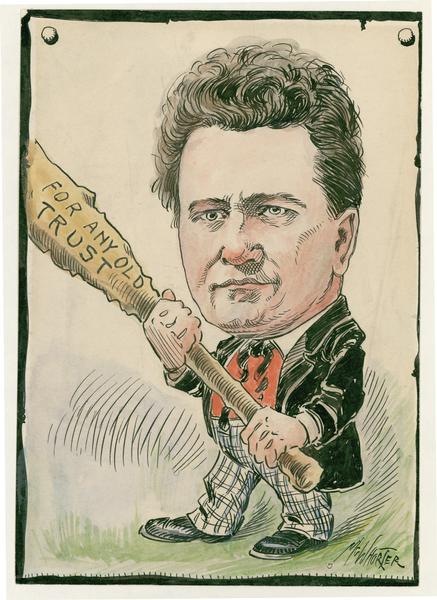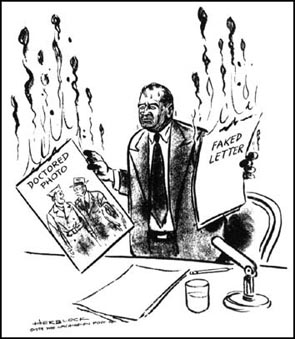Section. 3.
The Senate of the United States shall be composed of two Senators from each State, chosen by the Legislature thereof for six Years; and each Senator shall have one Vote.
Immediately after they shall be assembled in Consequence of the first Election, they shall be divided as equally as may be into three Classes. The Seats of the Senators of the first Class shall be vacated at the Expiration of the second Year, of the second Class at the Expiration of the fourth Year, and of the third Class at the Expiration of the sixth Year, so that one third may be chosen every second Year; and if Vacancies happen by Resignation, or otherwise, during the Recess of the Legislature of any State, the Executive thereof may make temporary Appointments until the next Meeting of the Legislature, which shall then fill such Vacancies.
http://www.archives.gov/exhibits/charters/constitution_transcript.html

AMENDMENT XVII
Passed by Congress May 13, 1912. Ratified April 8, 1913.
The Senate of the United States shall be composed of two Senators from each State, elected by the people thereof, for six years; and each Senator shall have one vote. The electors in each State shall have the qualifications requisite for electors of the most numerous branch of the State legislatures.
When vacancies happen in the representation of any State in the Senate, the executive authority of such State shall issue writs of election to fill such vacancies: Provided, That the legislature of any State may empower the executive thereof to make temporary appointments until the people fill the vacancies by election as the legislature may direct.
This amendment shall not be so construed as to affect the election or term of any Senator chosen before it becomes valid as part of the Constitution.
http://www.archives.gov/exhibits/charters/constitution_transcript.html

Two Republican Senators from Wisconsin : One elected by the State Legislature, one by the people directly. Ladies and Gentlemen of the Jury, I Rest my Case.
Whoops.
I'm informed that I have to make my case before I can rest it. So here goes.
First let me make myself clear. I am not advocating the repeal of the 17th Amendment, though there have been calls for that from the
intellectual right and the
left. In fact,
the top cluster on Clusty (anyone use Clusty besides me?) was "repeal". Rather what I'm arguing is that the direct election of senators, another centerpiece of Progressive Reform, was less than successful. How should success be measured? One way would be to compare Senators of both eras by standards of responsiveness to national needs, integrity, and authoring legislation producing lasting public good. One would be hard pressed to defend the superiority of either the class of Senators elected prior to the passage of the of the 17th Amendment or post it. The Wisconsin legislature produced
Robert M. Lafollete. The people of Wisconsin produced
Joseph R. McCarthy.
It would be hard to argue that the "Most Exclusive Club" isn't overbalanced with fairly mediocre members most of the time. So here's a little test. How many Senators in the current Congress can you name without peeking? (Back 15 minutes later after taking my own little test, I came up with 33, including two whose names I'm spelling dubiously, and a 34th I can only remember by L-I'm obviously repressing him, he's one of those Carolina guys who gets ten times the airtime he deserves to pontificate on foreign policy). If I get the name off the tip of my tongue I'll come back and fill in his name. Give me another half hour I'd probably come up with two or three more, as well as a couple who are dead, or really Governors or in the House. And I'm a political junky. My point, such as it is, is that I would remember more if they did anything bad enough or good enough or even funny enough to make remembering them worth the brain cell space.
So if neither system produced universally savant Solons, why care? I'd suggest that while the 17th amendment was supposed to take the Senate out of the hands of the "interests" and place it in the hands of the local people, what it did was nationalize the election by paving the way for the kind of campaigns we now have, largely funded by out-state money and more expensive every cycle. It is far easier for big Pharma or Big Insurance or Big anything to purchase the requisite number of votes to weaken, sidetrack, or kill legislation. At most, one would have to buy 100, but that's hardly necessary-five or ten does nicely.
Though I have no proof, I suspect it would cost national interests significantly more to purchase the legislatures of a simular number of states, and once the states had made their choices, the bought legislators would owe primary allegiance to the state political machine and not to the national corporation.
But wouldn't it be better to modify the system to reduce corporate influence entirely, or if not entirely, at least to an absolute minimum. McCain Feingold could be strengthened, but it looks as if the Conservative Judicial Activists are more likely to gut it next term.
What would be your dream solution. Here's mine: utterly impractical, but being a dream practicality doesn't figure into it.
- Accept the meme that Wall Street is trumpeting these days: that bloated compensation is necessary to attract and keep the best talent.
- Then raise the salary of senators to the mean compensation of the CEOs of the Fortune 500.
- Then require incumbents to finance their campaigns entirely from their own pockets.
- And finally, provide public financing for challengers to incumbency, with a fairly low bar for qualifying. Challengers would be allowed to raise funds from their supporters to augment the public financing, but there would be ceilings set for campaign spending, with challengers allowed a bonus to erase some of the competitive edge of incumbency. Only one's first election would require anyone to recruit contributors, and no contributor could rely on his/her candidate taking orders from the office, as the trough would be off limits after that first campaign.

